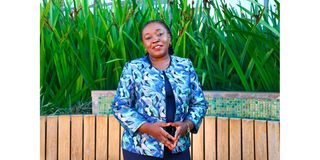Prof Nancy Booker, a force for digital media education

Prof Nancy Booker during an interview at Aga Khan University, Parklands, Nairobi, on June 8, 2023. She is the new dean of the Aga Khan University Graduate School of Media and Communications.
What you need to know:
- Now at the helm of one of the premiere media and communications graduate schools in Kenya, Prof Nancy Booker shares her plans for the institution.
- She says women in media have made such great strides and that should inspire a lot younger women to step up and take up leadership positions in the industry.
Professor Nancy Booker, the new dean of the Aga Khan University Graduate School of Media and Communications (GSMC), is one of the forces behind the digital media education transformation in East Africa. She has been serving as interim dean until her confirmation last Thursday.
“I grew up in an era when TV, then VoK (Voice of Kenya), would come on at 4pm and shut down at about 11pm. I was always fascinated by the news segment. I remember the adrenaline rush that I felt when I saw investigative reporters in the field covering stories that people were too afraid to talk about," she said in a sit-down interview with the Nation.
Now at the helm of one of the premiere media and communications graduate schools in Kenya, the seasoned media practitioner and scholar shares her plans for the institution where she also serves as an associate professor.
“When I joined the school in 2017, we were only offering professional development courses while the Commission of University Education was in the process of accrediting our Master of Arts in Digital Journalism programme. A year later, we admitted students to the programme,” she says.
While traditional media houses struggled with the digital revolution, the newly launched programme became the port of call for many media professionals looking to survive and thrive in the fast-changing industry.
Also read: Women deserve an even chance in media leadership
“At the time, most of the students we admitted had an average of seven to eight years’ experience, but it was interesting that a lot of aspects of the programme were new to them, yet they were joining the programme when the digital revolution had taken shape in the media industry.”
Breaking down silo mentality
She adds that their lack of multi-platform skills did not surprise her as a lot of journalists at the time worked in silos and that was how journalism was taught for a long time.
“Technology has broken those silos and while our students could choose an area of immersion where they focused their studies, we had to ensure they could work across those various platforms to become multimedia journalists.”
While she maintains that the principles of good journalism remain steadfast, the context in which it is practised has evolved and journalists must evolve as well.
GSMC soon after launched an executive master’s programme in media leadership and innovation. Despite being introduced at the height of the Covid-19 pandemic, the programme was a huge success, and she recounts the several hours the team worked, to get it going.
“We quickly transitioned to online learning and adapted a blended format of in-person and virtual classes, and because we had already invested in building the capacity of our faculty to optimise technology for teaching and learning through AKU’s Network of Quality Teaching and Learning, we had a seamless transition as Covid-19 struck,” she explains.
Media career
Prof Booker spent her early years at the Kenya Broadcasting Corporation (KBC) and the Nation Media Group, where she worked as a programmes producer and programmes researcher respectively. As such, she knows all too well that women are still underrepresented in the media leadership.
“The rise of women in media leadership has been very slow. As a result, one may not immediately feel the impact because of the slow nature of that evolution. There are still instances where women’s voices are not represented. Women are rarely assigned the ‘big stories of the day’ and their representation in editorial decision-making is still quite small.”
Nonetheless, she adds that women in the industry have made such great strides and that should inspire a lot younger women to step up and take up leadership positions in media and communications.
“We are also very deliberate in our admissions at GSMC in that we seek out women who are qualified and who merit to join our programmes such that they make up about 40 per cent of the class size in our master’s programmes.”
Journey in academia
Before joining Aga Khan University in 2017, Prof Booker was the chairperson of the journalism and communication department at the Multimedia University of Kenya, a position she held for five years. Prior to that, she taught for nearly 12 years at Daystar University, where she spent her formative years as an academic, and was seconded to ABC University in 2009 where she established the journalism and communication programme and became the first academic head of programme in post-war Liberia.
She attributes her success – as a member of the Kenya Editors Guild, the Board of the East Africa Communication Association, the Association of Media Women in Kenya, the International Association of Media and Communication Research's Clearing House for public statements and the Media Complaints Commission in Kenya – to the mentors she had in her life over the years.
Moving forward, she plans to advance the school’s academic programmes so that they are responsive to the realities of the digital revolution and to sustainability. Prof Booker is keen to grow GSMC’s presence beyond East Africa, having found that a diverse student body enriches learning experience and offers different perspectives to students.
To unwind, she will find a documentary or a good movie on Netflix or, take time to be away from the city to enjoy verdant environments, immersing herself to the melodic symphony of chirping birds. “Nothing can be more soothing,” she says.





